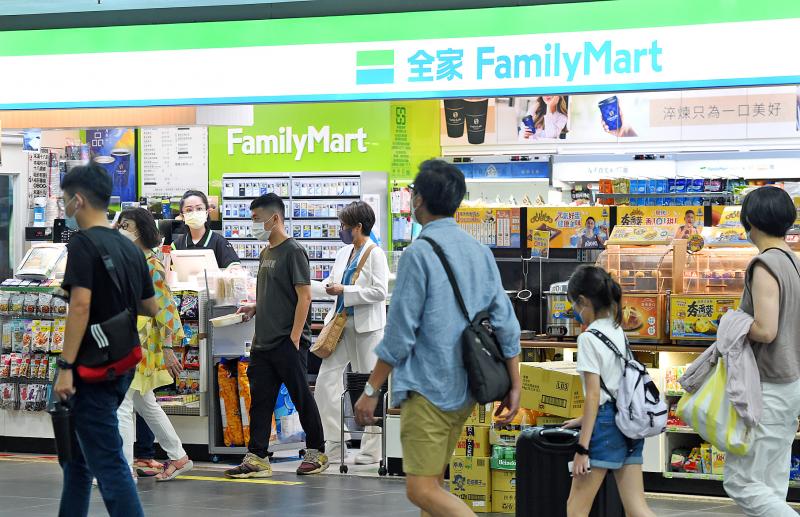The consumer confidence index this month sank to 64.5, the lowest in 12.5 years, as a persisting stock rout and COVID-19 infections have made consumers apprehensive, a survey by National Central University found yesterday.
The index fell 3.67 points from one month earlier to the same level as the global financial crisis in 2008-2009, with all six component measures taking a hit, said Dachrahn Wu (吳大任), director of the university’s Research Center for Taiwan Economic Development, which conducted the survey.
In particular, the sub-index on stock investment tumbled 7.4 points to a record low of 25.5, suggesting that a majority of investors prefer to stay on the sidelines, scared by wild corrections at home and abroad, Wu said.

Photo: Liao Chen-hui, Taipei Times
The sub-index on the nation’s economic outlook fell 4.9 points to 80.95, the softest since June 2020, as concerns over an economic turnaround continue to build up even though key economic bellwethers, such as exports and industrial output, hold firm, Wu said.
Confidence values of 100 and more suggest positive sentiment and scores lower than the threshold indicate pessimism.
Interest rates on 30-year mortgages approached 6 percent in the US, which could squeeze spending on non-essential items, Wu said, adding that the trend is unfavorable for Taiwanese manufacturers, because many supply electronic parts used in smartphones, laptops, TVs, vehicles and peripheral devices.
Taiwanese also expressed unease over rising inflationary pressures, depressing the confidence measure on consumer prices to 26.65, the lowest level since December 2008, the survey showed.
Consumer price hikes are most evident at restaurants and department stores, Wu said.
Interest in consumption of durable goods shed 2.9 points to a record low of 111.9, while interest in real-estate properties dropped by 5.55 points to 105.55, the lowest since the launch of the index, the university said.
Taiwan’s interest rate hikes, although relatively moderate, would still make buyers cautious about financial planning to avoid cash strain, Wu said.
The central bank has raised interest rates by 1.5 percent in two adjustments this year and is expected to tighten further if consumer prices fail to ease.
The university said it polled 2,792 adults between June 18 and Tuesday last week by telephone.

TECH BOOST: New TSMC wafer fabs in Arizona are to dramatically improve US advanced chip production, a report by market research firm TrendForce said With Taiwan Semiconductor Manufacturing Co (TSMC, 台積電) pouring large funds into Arizona, the US is expected to see an improvement in its status to become the second-largest maker of advanced semiconductors in 2027, Taipei-based market researcher TrendForce Corp (集邦科技) said in a report last week. TrendForce estimates the US would account for a 21 percent share in the global advanced integrated circuit (IC) production market by 2027, sharply up from the current 9 percent, as TSMC is investing US$65 billion to build three wafer fabs in Arizona, the report said. TrendForce defined the advanced chipmaking processes as the 7-nanometer process or more

Who would not want a social media audience that grows without new content? During the three years she paused production of her short do-it-yourself (DIY) farmer’s lifestyle videos, Chinese vlogger Li Ziqi (李子柒), 34, has seen her YouTube subscribers increase to 20.2 million from about 14 million. While YouTube is banned in China, her fan base there — although not the size of YouTube’s MrBeast, who has 330 million subscribers — is close to 100 million across the country’s social media platforms Douyin (抖音), Sina Weibo (新浪微博) and Xiaohongshu (小紅書). When Li finally released new videos last week — ending what has

OPEN SCIENCE: International collaboration on math and science will persevere even if the incoming Trump administration imposes strict controls, Nvidia’s CEO said Nvidia Corp CEO Jensen Huang (黃仁勳) said on Saturday that global cooperation in technology would continue even if the incoming US administration imposes stricter export controls on advanced computing products. US president-elect Donald Trump, in his first term in office, imposed restrictions on the sale of US technology to China citing national security — a policy continued under US President Joe Biden. The curbs forced Nvidia, the world’s leading maker of chips used for artificial intelligence (AI) applications, to change its product lineup in China. The US chipmaking giant last week reported record-high quarterly revenue on the back of strong AI chip

Qualcomm Inc’s interest in pursuing an acquisition of Intel Corp has cooled, people familiar with the matter said, upending what would have likely been one of the largest technology deals of all time. The complexities associated with acquiring all of Intel has made a deal less attractive to Qualcomm, said some of the people, asking not to be identified discussing confidential matters. It is always possible Qualcomm looks at pieces of Intel instead or rekindles its interest later, they added. Representatives for Qualcomm and Intel declined to comment. Qualcomm made a preliminary approach to Intel on a possible takeover, Bloomberg News and other media